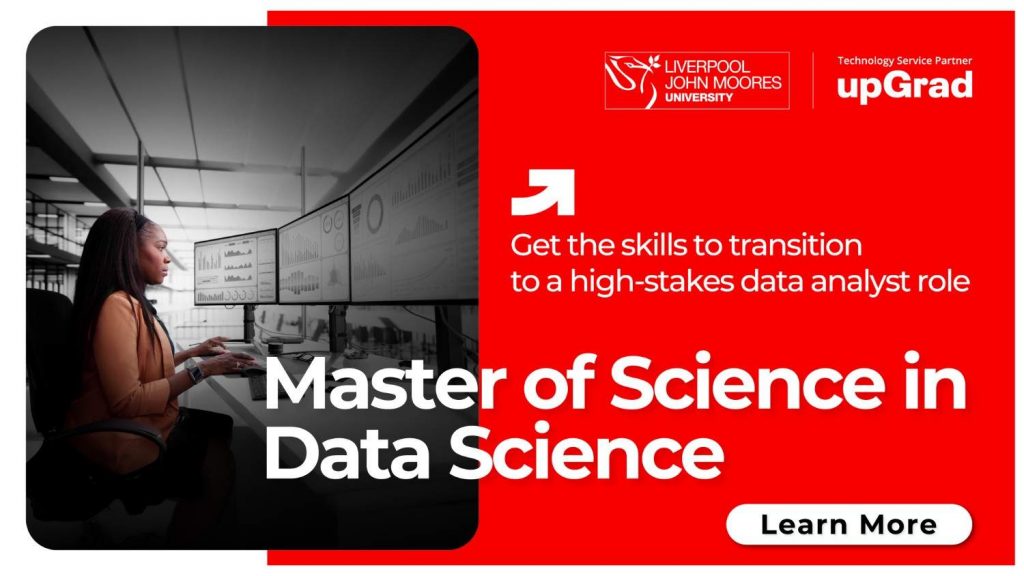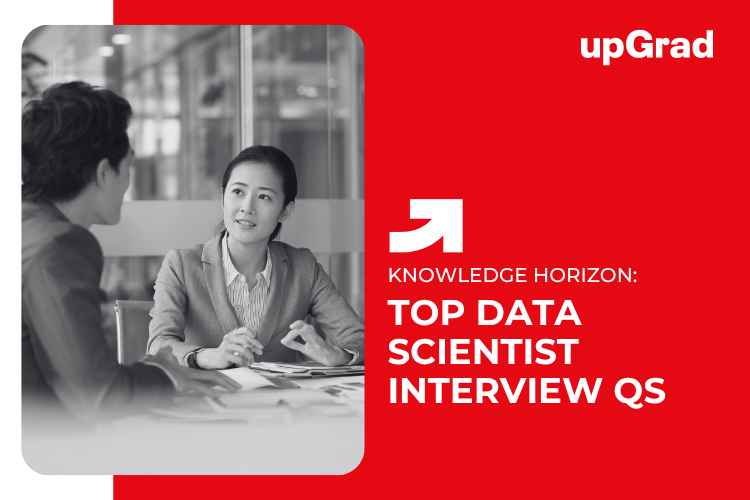The top companies hiring data scientists in Singapore conduct extensive interviews before finalising candidates. The common interview questions are designed to assess your basic knowledge as well as your advanced technical skills.
As a data scientist working in Singapore, you can earn an average annual salary of SGD 8,250 per year.
Explore common data scientist interview questions and their respective answers, and be prepared to stand out in the highly competitive arena.
Also Read: Best Programming Languages for Data Science in 2026
Top Data Scientist Interview Questions and Sample Answers
If you’re currently preparing for data science roles in Singapore, make sure you’re going through the list of common interview questions and sample answers, shared below.
Common Interview Questions and Sample Answers
Here’s a look at the top common interview questions and answers:
1. What is Data Science?
Data science involves the deployment of programming, statistics, and domain expertise to extract meaningful insights from a massive volume of available data.
2. Explain the difference between supervised and unsupervised learning.
Supervised learning, usually used for classification tasks, focuses on input-output pairs. Unsupervised learning, on the other hand, identifies groupings or patterns without predefined labels.
3. What is overfitting, and how can it be prevented?
Overfitting occurs when a data model ends up memorising training data too closely and offers generalised answers based on that memory.
4. How do you handle missing or corrupted data in a dataset?
The method of handling missing data involves identifying the reason behind the missing data and then deploying imputation, deletion, or flagging.
5. Describe a time when you explained a complex data science concept to a non-technical stakeholder.
This one remains one of the common questions they ask in an interview. Answers may vary widely based on individual experiences. We have shared an example below.
I once helped business leads grasp model accuracy by translating accuracy metrics, analogies, and visuals, such as graphs and charts.
Also Read: Data Scientist Demand in Singapore: Top Companies Hiring in 2026
6. What is cross-validation, and why is it important?
Cross-validation is a key step in model evaluation. It helps evaluate generalising tendencies of models by testing them on different data subsets, thereby preventing inaccuracies like overfitting.
7. How do you ensure your models are not biased?
I usually start by examining data sources and their representation, evaluating model performance across groups, and performing audits on a regular basis to ensure fairness.
8. Can you walk me through a data project you worked on from start to finish?
For a campaign optimisation project at my previous company, I gathered user data, engineered relevant features, built and tuned a logistic regression model, and then deployed it to production.
9. What are the most essential data visualisation techniques, and when would you use them?
Bar plots are best suited for comparing categories, such as revenue or market share, while line plots help visualize trends over time. Histograms reveal how numeric data is distributed.
10. How do you select the correct algorithm for a data science project?
Choosing an algorithm begins with understanding the problem—whether it involves classification, regression, or clustering—and evaluating the structure and size of the dataset.
Also Read: Data Science vs. Machine Learning Engineer
Common Behavioural and Technical Questions in Data Science Interviews
Besides the general interview questions listed above, be prepared to ace the common behavioural and technical questions as well.
Here’s a quick look at the top behavioral and technical interview questions for data scientists in Singapore:
|
Questions |
Sample Answers |
| How do you deal with messy data sets? | Messy data sets can be fixed by removing unwanted data sets and fixing structural errors |
| How do you handle data quality issues? | Through the implementation of robust data validation and monitoring processes |
| How do you ensure the right balance of speed and accuracy while deploying machine learning models? | It can be done through selecting the correct algorithms and optimising training processes |
| What is logistic regression? | It’s deployed in supervised machine learning for classification problems |
| What is a linear model? What are its drawbacks? | It’s a linear mathematical representation of variables susceptible to overfitting. |

How upGrad Empowers Singapore Students for Data Science Careers
Strengthen your data science interview preparation by enrolling in one of the Data Science & Analytics courses offered by upGrad. The duration of these Master’s and Diploma courses varies from 6 to 18 months, offering facilities such as online learning and specialisations in preferred domains:
Explore these online courses through upGrad!
- MS in Data Science from Liverpool John Moores University
- Executive Diploma in Data Science and AI
- Executive Post Graduate Certificate Programme in Data Science
🎓 Explore Our Top-Rated Courses in Singapore
Take the next step in your career with industry-relevant online courses designed for working professionals in Singapore.
- DBA Courses in Singapore
- Data Science Courses in Singapore
- MBA Courses in Singapore
- Master of Education Courses in Singapore
- AI ML Courses in Singapore
- Digital Marketing Courses in Singapore
- Product Management Courses in Singapore
- Generative AI Courses in Singapore
Related Article
MBA Interview Questions & Tips For Success
FAQ on Data Scientist Interview Questions in Singapore
Q: What are the key skills required for a data scientist role?
Ans: Programming, data wrangling, database management, statistics and probability, and machine learning and deep learning are the top skills every data scientist should have.
Q: What programming languages are essential for data science?
Ans: Python, R, SQL, Java, and Julia are a few programming languages essential for data science. There are several hundred programming languages out there – some of which suit the specifics of your role as a data scientist better than other.
Q: What industries in Singapore are hiring data scientists?
Ans: Science and Technology, information and communication technology, banking and financial services, Digital Marketing, and Healthcare are among the top industries hiring data scientists in Singapore.
Q: How does upGrad support career transitions into data science?
Ans: upGrad supports career transitions in data science through its comprehensive data science courses, which focus on developing both behavioural and technical attributes, its strong network of recruiters, and unparalleled career guidance.
Q: Which companies in Singapore are hiring data scientists?
Ans: Some of the well-known companies currently hiring data scientists in Singapore are Moloco Singapore PTE Limited, Marina Bay Sands, Alexandra Hospital, Airwallex, and Yokogawa Engineering Asia PTE Ltd, among others.




















